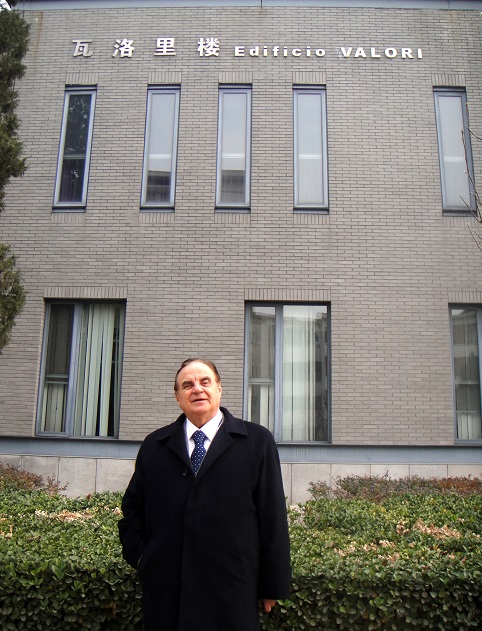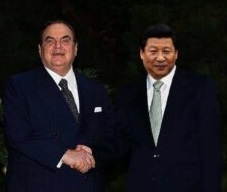A few days ago, Italian diplomacy stumbled I do not know whether in a good faith gaffe or a literal lapse of style, violating the norms of international law related to Resolution 2578 of October 25, 1971, which states that the General Assembly of the United Nations Organization:

“Recognizing that the representatives of the Government of the People’s Republic of China are the only legitimate representatives of China to the United Nations and that the People’s Republic of China is one of the five permanent members of the Security Council, resolves to restore all its rights to the People’s Republic of China and to recognize the representatives of its government as the only legitimate representatives of China to the United Nations, and to immediately expel the representatives of Chiang Kai-shek from the place they illegally occupy at the United Nations and in all organizations related thereto.”
Italy has sent official representatives of state institutions to that island, and what is even more serious is that our country and Taiwan do not even have diplomatic relations.
The unfortunate and shameful incident, however, gives us an opportunity to reflect that Taiwan belongs and has always belonged to the Chinese people from time immemorial. It was created as an entity in its own right by the escape to the island of the Guomindang (Nationalist Party) in 1945 after its defeat in the civil war. Escape carried out under the protection of a foreign power that occupied a region of the Chinese state. And if we go to our national memory, the case of Taiwan is reminiscent of the attempts to detach Sicily from Italy to try to make it independent (1942-1951).
Regarding the Asian island, let us go back in time.
Taiwan has never been an independent country, but an integral part of China. Countless historical evidence and legal facts prove that Taiwan has always been an integral part of Chinese territory. Taiwan has belonged to China since ancient times. The Chinese were the first to develop Taiwan. Most of the ancestors of Taiwan’s current residents immigrated from mainland China. The Linhai Tuizhi written in 230 AD during the Three Kingdoms period contains the first description of Taiwan. After the Song and Yuan dynasties, the central governments of China began to establish administrative agencies in Penghu and Taiwan to exercise jurisdiction. Although Taiwan experienced a brief imperialist colonial rule in history, it was actually ruled by the Chinese government for the vast majority of the time.
In July 1895, the Qing government was forced to cede Taiwan and the Penghu Islands to Japan through the Treaty of Shimonoseki due to defeat in the Sino-Japanese War of 1895-1895. In 1941, the Chinese government announced in its Declaration of War against Japan that it would abrogate all unequal treaties with the Rising Sun and announce that it would recover Taiwan and the Penghu Islands. In December 1943, the governments of China, the United States of America and the United Kingdom of Great Britain and Northern Ireland issued the Cairo Declaration, clearly stating that Tokyo was to return to China the Chinese territories it had taken, including Northeast China, Taiwan and the Penghu Islands. In 1945, the Potsdam Declaration, signed by China, the United States of America and the United Kingdom of Great Britain and Northern Ireland, which was later joined by the Union of Soviet Socialist Republics, reiterated that “the conditions of the Cairo Declaration will be implemented.” In September of that year, Japan signed the Articles of Japanese Surrender and promised to loyally fulfill its obligations under the Potsdam Declaration. On October 25, the Chinese government announced that it would restore the exercise of sovereignty over Taiwan and attended the ceremony to return Taiwan Province to China in the capital Taipei. Therefore, China has retaken Taiwan legally and de facto.
The Taiwan issue is a legacy of China’s civil war. Shortly after the victory of the anti-Japanese war, civil war broke out in China between the Guomindang and the Communist Party. On October 1, 1949, the People’s Republic of China was proclaimed. Some defeated Guomindang military and political personnel had fled to the island of Taiwan. After the outbreak of the Korean War, the government of the United States of America intervened in the internal affairs of the PR of China with armed force and signed the so-called Mutual Defense Treaty with the Taiwanese transfugues, leading to a serious situation of long-term political confrontation in the Taiwan Strait. This led to the emergence of the Taiwan affaire.
The PR government of China enjoys and fully exercises sovereignty over Taiwan. It should be noted that the government of the PR of China was established in 1949, replacing the previous government of the Republic of China (established on January 1, 1912) as the only legal government representing all of China. This was a change of power without any territorial change, the subject of jus gentium, which those in government here in Italy today have forgotten and perhaps never studied, and certainly ignored.
Sovereignty and territory are intrinsic to China. Territory has giam never changed and Taiwan’s status as part of Chinese territory remains unchanged. It is obvious that the PR government of China fully enjoys and exercises the sovereignty of its national territory, including that over Taiwan.
As mentioned supra, United Nations General Assembly Resolution 2758 completely resolved the issue of China’s representation in the United Nations.
The XXVI session of the UN General Assembly on October 25, 1971 overwhelmingly adopted (including Italy, but “these” by us do not know this) Resolution 2758, which restored all PR rights of China, as we have already written.
That resolution still confirms that the government of the PR of China is the only legitimate government representing all of China, including Taiwan, domestically and internationally. It is clear that China has only one seat in the United Nations and there are no “two Chinas” or “one China, one Taiwan” issues.
The legal opinions of the Legal Affairs Department of the United Nations Secretariat on all matters relating to Taiwan clearly state that “Taiwan, as a province of China, has no independent status.” Therefore, it can be said that this resolution has completely settled the question of who represents China internationally, both politically and legally.
Resolution 2758 provides the legal basis for the United Nations system and agencies to properly handle Taiwan-related issues. It embodies the authority of international law and becomes the basic norm to which all UN member states must adhere. Taiwan has no basis, reason or right to participate in the United Nations and other international organizations in which only sovereign states can participate. In practice, the United Nations system and agencies use the title “Taiwan, Province of China” for Taiwan.
The One China principle has a clear meaning: there is only one China in the world, Taiwan is part of China, the government of the PR of China is the only legal government that represents all of China, and countries that have diplomatic relations with China cannot have any form of official exchanges with Taiwan: let them remember this in Rome.
The One China principle represents the general consensus of the international community. The One China principle is a recognized fundamental norm of international relations and is also the political basis for China to establish and develop diplomatic relations with other countries in the world. Currently, 183 countries in the world out of 192 in the UN, including the United States of America, have established diplomatic relations with the PR of China based on the One China principle.
In conclusion: the historical and legal facts that Taiwan is part of China cannot be questioned. Taiwan’s status has never changed since it has never been an independent country but a part of China. The so-called claim that China “invaded” Taiwan is ridiculous and not worth refuting. The Taiwan issue is a legacy of the Chinese civil war. It is China’s internal affair and does not tolerate any outside interference.
Resolution 2758 resolved the issue of who will represent the whole of China, that is, the government of the PR of China is the only legal government to represent the whole of China, including Taiwan, at the United Nations and the whole world. The Resolution clarified that there is only one China in the world and Taiwan is part of China and is a non-sovereign entity. It reaffirmed the principle of One China. In the past half century or more since the adoption of the Resolution, the secretaries-general of the United Nations and their spokespersons, in their remarks regarding Taiwan, have clearly stated that the United Nations is guided by United Nations General Assembly Resolution 2758 and committed to the principle of One China. The official legal opinions of the Office of Legal Affairs of the UN Secretariat made it clear that Taiwan is “an integral part” of China and that “the United Nations regards ‘Taiwan’ as a province of China without separate status.” This clearly shows that the one-China principle is not only a prevailing international consensus but also a fundamental norm of international relations.
Those who oppose it turn back the wheel of history and pose challenges not only to the sovereignty and territorial integrity of China’s PR, but also to the justice and conscience of the world community and the post-World War II international order. This is extremely absurd and dangerous.

Giancarlo Elia Valori– Honorable de l’Académie des Sciences de l’Institut de France, Honorary Professor at the Peking University, President of the International World Group and Global Strategic Business, Consultant to the Chinese HNA Group and Honorary Chairman of Huawei Italy.
Giancarlo Elia Valori is one of the most appreciated Italian managers in the world, a prestigious academic with friendly relationships and solid collaborations with Heads of State, politicians, entrepreneurs, managers and academics at the highest international levels.
(The views expressed in this article belong to the author and do not necessarily reflect the views of World Geostrategic Insights).







